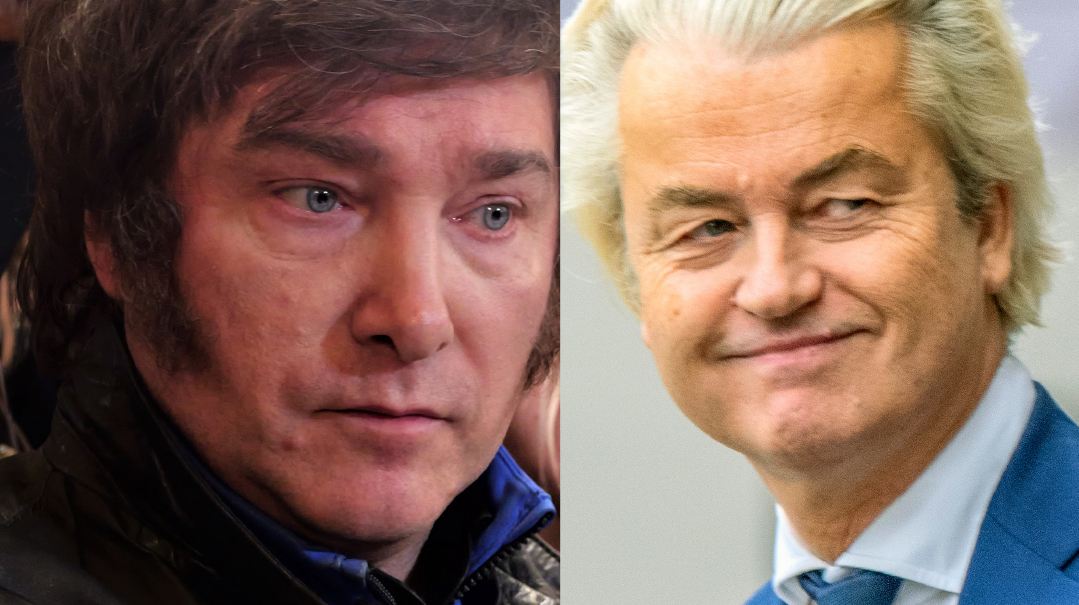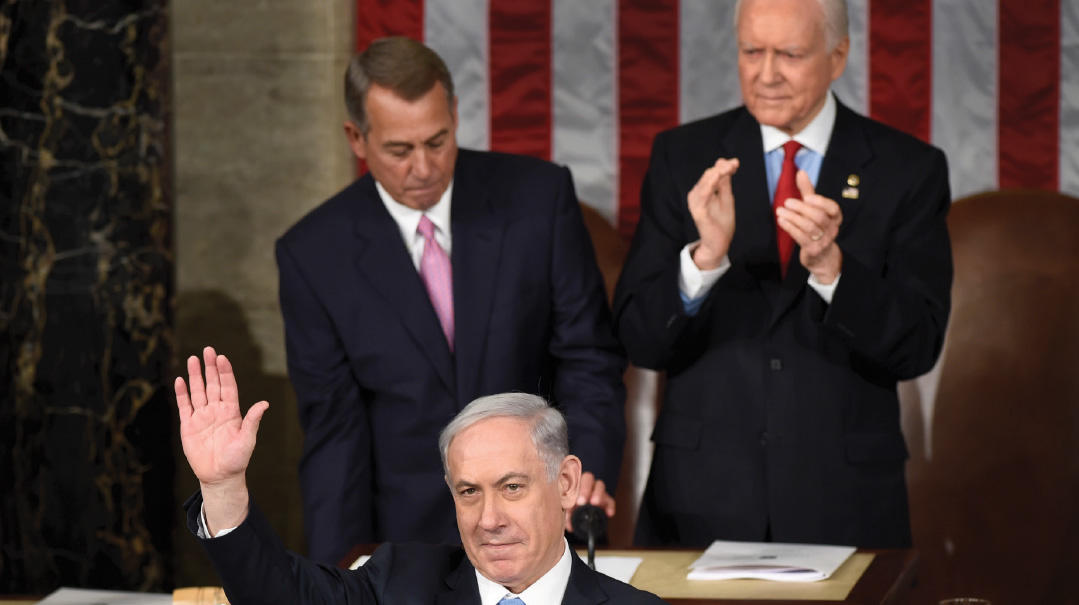Doubly Shocked

In Argentina and Holland, new pro-Israel leaders are upending politics

Two election results last week, in the Netherlands and Argentina, delivered jolts that left some political analysts searching for an underlying trend. Last Sunday, Argentinean voters elected libertarian maverick Javier Milei as their president. Then on Wednesday, Dutch voters gave the most parliamentary seats to Geert Wilders, a right-wing anti-immigration firebrand.
Although the overall situations in Argentina and the Netherlands are too disparate to warrant direct comparison, it can be said that the votes propelling Milei and Wilders to victory came not necessarily from a base of core supporters but rather from voters disenchanted with mainstream parties. And that is a phenomenon that has cropped up elsewhere: Populist parties are increasingly occupying a space historically reserved for leftist factions and funneling popular anger against ruling elites.
And there is another striking common thread: Both of last week’s surprise victors exhibit support for the State of Israel at a level rarely seen. Although right-wing politicians in Italy, France, the United Kingdom, and the United States have campaigned for Jewish votes by declaring solidarity with Israel, in the cases of Argentina and the Netherlands, the connection is more pronounced. Both Javier Milei and Geert Wilders have forged exceptionally personal connections with the Jewish People.
Fed Up in Argentina
Javier Milei found fertile soil for his upset electoral win in the current Argentinean economic environment.
“In the context of the worst economic crisis since 1990, with an inflation rate approaching 150%, and at least 45% of the population living in poverty, if the candidate proposed by the ruling party is responsible for the economic turmoil, you’ll vote for anyone else,” sums up Argentine political analyst Nicolás Lucca in a conversation with Mishpacha.
That “anyone else” turned out to be an unexpected candidate who, in just two years, transitioned from being a television panelist to defeating the powerful Peronist party.
Economist Javier Milei stormed into the Argentine public eye by championing libertarian free-market ideals and making extreme rants against the left. In his speeches he frequently mentioned the Austrian School and Friedrich Hayek, economists unfamiliar to the majority of the population. However, it would be naive to claim that Argentinians voted for Milei based on his economic theories.
“To think that 55% of the electorate thinks in left-right dichotomies is to misunderstand elections,” explains Lucca. “Milei doesn’t embody the right. He embodies change in the face of what was in power.”
Javier Milei charted his path to victory by taking constant aim at what he termed “the political caste.” Throughout the campaign he repeated the slogan, “A different Argentina is impossible with the same old faces,” making clear that both ruling and opposition parties have been trotting out familiar figures, repeating the same mistakes for years without addressing the concrete problems of the people.
But although during the campaign Milei led the charge against “the caste,” his party has already had to seek support from the traditional right. Argentina’s presidential elections, like those in France, take place in two rounds. In the first round, Milei’s party, La Libertad Avanza, garnered a respectable 30% of the votes, but insufficient for victory. To win the runoff in the second round, Milei appealed to right-wing voters whose preferred candidates lost.
“There’s a 24% that voted for him in the second round just to avoid voting for the alternative,” asserts Lucca, emphasizing that a significant portion of voters is not convinced by this new president.
Milei will assume office on December 10, facing the daunting challenge of rebuilding a society in the midst of an unprecedented economic slump.
“It’s unprecedented in Argentina for a candidate to win by promising austerity amid one of the worst economic crises in history,” says Lucca. “It’s intriguing, because even if the miracle happens, and the 55% who voted for him say, ‘I voted for this and we have to endure it,’ you have another 45% that voted for the other option. That’s around 12 million people who voted ‘not this,’ so I don’t know what the margin of maneuver is. This is all new uncharted territory.”
Fear of Islam
In the Netherlands, voters’ grievances were not about corruption or inflation but rather uncontrolled immigration, primarily from Islamic countries. Geert Wilders, who has long campaigned on an anti-immigration platform, was seen as the best solution.
Wilders has been dividing Dutch society for over 20 years, and his openly anti-immigration stance and staunch rejection of Islamism puts him on the fringes of Dutch politics. Nevertheless, his Party for Freedom (VVD) managed to capitalize on Dutch anxieties and demands for increased security. He won an upset in last week’s elections; the VVD became the country’s largest party, winning 37 out of 150 seats in the House of Representatives.
“The main message from the ballot focuses on immigration and the integration of ethnic minorities,” explains Dutch professor Joost van Spanje, currently head of the political science department at Royal Holloway – University of London. “Most of the people who vote for him do not agree with the quite radical party program.”
But he stressed that they do have concerns about crime rates and the difficulty of finding housing, which they attribute to the growth of immigration.
Despite the significant block of seats he holds in the Dutch parliament, it is probable that Geert Wilders won’t become prime minister, at least for now.
“He will have to give in a lot in order to bring other people to the table,” says Professor van Spanje. “One of the things that he might have to give in on is being prime minister. I wouldn’t be surprised if someone else became PM, even someone from a party outside the coalition but who supported the formation of a center-right government.
However, regardless of the outcome, the revolution led by Wilders sends a clear message to Europe: Not only is the far right paying close attention to the plight of disaffected voters, but citizens are also becoming less hesitant to vote for them.
Personal Interest in Israel
While the campaigns of Javier Milei and Geert Wilders differed significantly, they both skillfully leveraged one belief they hold in common to attract “values” voters: their personal love for Israel.
“The reason that candidates support Israel, and that people respond to that, is very simple,” explains French political scientist Jean-Yves Camus to Mishpacha. “The left has been so inclined to say that Hamas is not a terrorist group but a ‘resistance movement.’ There comes a moment when decent citizens, who just want to live a peaceful life here, say, ‘The left has betrayed its values.’ So, nowadays, many conservative and far-right parties have decided to be pro-Israel. They believe in telling the truth about what is happening in the Middle East. There are aggressors, Hamas and Hezbollah, and on the other side is a democratic country fighting for its life.”
Even beyond the political calculations, though, these two leaders have undeniably personal connections with the Holy Land.
During his campaign’s closing event, Javier Milei waved a massive Israeli flag, declaring that Argentina should align itself with countries like “the United States or Israel.” To the average voter, accustomed to seeing his country doing business with Iran or Venezuela, these words mean that Argentina should finally be a partner with Western democracies. But Milei studies Torah, seeks advice from an Orthodox rabbi, and has expressed his intention to convert to Judaism once he leaves office.
Dutch voters see in Israel an example of a Western democracy that has managed to endure and resist Islamic radicalism, which is their greatest fear. But beyond that, Geert Wilders volunteered for a year at Moshav Tomer and has visited the country over 40 times.
“I have visited many interesting countries in the Middle East — from Syria to Egypt, from Tunisia to Turkey, from Cyprus to Iran — but nowhere did I have the special feeling of solidarity that I always get when I land at Ben-Gurion International Airport,” Wilders said at one point.
Wilders’s case is more complex than Milei’s, though. Although he supports Israel, he has a strained relationship with religion in general, and he has attempted (so far unsuccessfully) to ban shechitah in the Netherlands.
Those differences aside, it seems clear that Israel’s war with Hamas is reverberating throughout the world in ways that were unforeseen two months ago. All eyes will turn to America next year as its presidential election gets underway in earnest.
(Originally featured in Mishpacha, Issue 988)
Oops! We could not locate your form.







